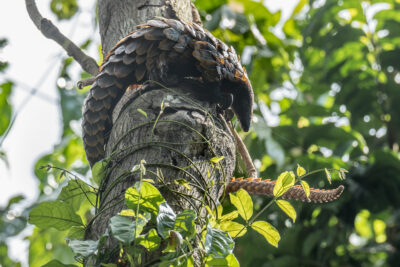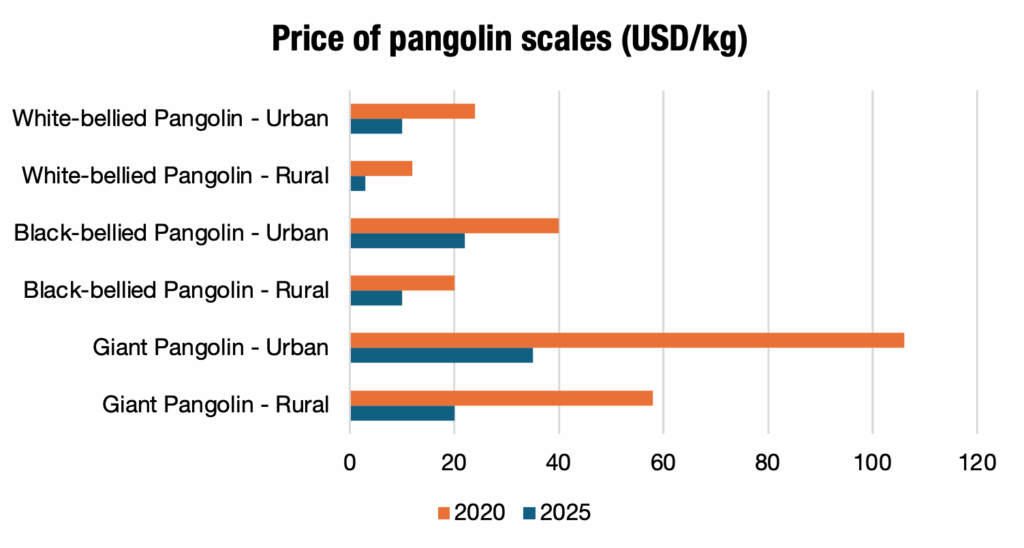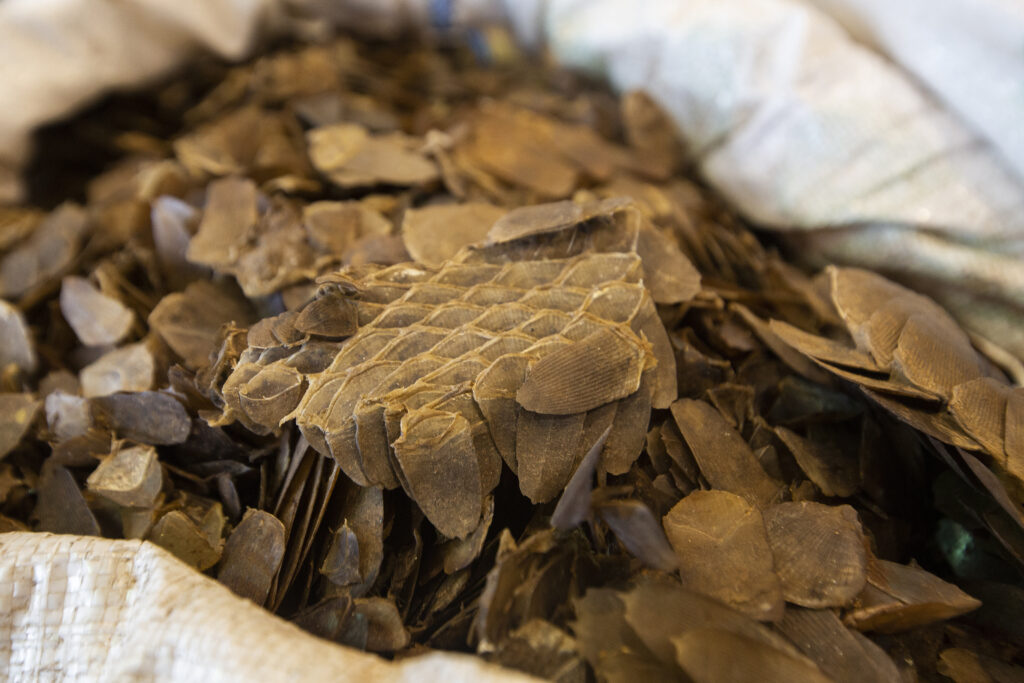
The price of pangolin scales has fallen by half or more in Cameroon in the last five years, market data shows. That has coincided with evidence of a fall in demand from China and more effective domestic law enforcement, offering new hope in saving these shy, endangered animals from extinction.
Data compiled by the wildlife law enforcement group LAGA shows declines of between 45% and 75% in the average prices of scales for all three species of pangolin found in Cameroon, in both rural and urban areas, between 2020 and 2025.
Separately, WildAid has observed a decline in demand for pangolin meat, scales, and wine in China, as the government there has been discouraging the consumption of pangolin products and the use of scales in traditional medicine.
Chinese buying also fell in Cameroon after a series of arrests of international traffickers and the seizures of many tons of pangolin scales in separate investigations between 2017 and 2019, said Gilbert Atem, head of investigations for LAGA.
Demand for pangolin scales in Asia has fueled the poaching of all eight pangolin species found in Asia and Africa, earning the pangolin the unhappy distinction of becoming the most heavily trafficked wild mammal on the planet. A 2023 DNA analysis showed that most of the pangolin scales found in shipments seized in Asia between 2012 and 2018 originated from Cameroon, especially from the south of the country.
But the recent data on prices offers a ray of hope, suggesting that falling demand for scales from China is translating into lower profits for traffickers and less incentive to poach these animals.


The decision indicates that these medicines no longer meet official criteria for safety, efficacy, or ethical acceptability, discouraging healthcare providers from using them. At the same time, efforts are underway within the traditional medicine community, both in China and abroad, to replace formulas using endangered species such as pangolins with sustainable alternatives.
In Cameroon, pangolins are hunted both for their meat and their scales, with significant consumption of pangolin meat observed in towns and cities, driving an unsustainable commercial trade. The scales are exported to Asia for use in traditional medicine.
WildAid has been working in Cameroon to raise awareness of the threats facing pangolins and reduce urban demand for pangolin meat since 2022. Here too, there are signs of significant progress. In 2024, a WildAid survey found a 27% decline in the number of people who said they consume pangolin meat at least once a month in Yaoundé, Douala, Ebolowa, and Mbalmayo compared to 2022.
The government has stepped up the fight, passing a new forestry and wildlife law in 2024 that sharply increased the penalties for slaughtering, capturing, keeping, or marketing Class A protected animals, including pangolins. Fines of up to 50 million francs ($89,000 USD) and prison sentences of up to 20 years can now be imposed.


Falling demand from China and better law enforcement had caused buying to dry up, said LAGA’s Atem. He cited the arrest of two Chinese traffickers in Douala in 2017, and the seizure of 5.4 tons of pangolin scales — as well as two other investigations that led to the seizure of more than 700kg of scales and six arrests in 2018, and the seizure of two tons of scales and 200kg of ivory in 2019, with four arrests made.
Atem cautioned that black market prices can fluctuate and are not exact, but added that there was a clear trend towards lower prices from 2020 onwards.
Traders used to go door-to-door in villages buying scales from hunters, and then selling them on to Chinese buyers, he said. But after demand decreased, this activity also dried up, leaving sellers with stockpiles on their hands and therefore willing to accept much lower prices.
Traders have also been discouraged by the growing risk of being caught, added LAGA Deputy Director Eric Kaba Tah. “What I call opportunistic traffickers turn to shun trafficking when they know the price to pay is imprisonment,” he said. “This disrupts the market, discouraging demand and the illegal trade.”
Meanwhile, WildAid’s “No Pangolin on my Plate” campaign continues to go from strength to strength, as restaurants in Yaoundé, Douala, Bertoua, Ebolowa, and Mbalmayo are publicly pledging to stop serving pangolin meat.
Already, 153 restaurants that were serving pangolin meat in those cities and towns have now pledged to take it off their menus. That’s more than half the pangolin restaurants that our campaigners have visited. A further 378 restaurants serving other types of wild meat and traditional food have also joined the campaign, publicly committing to not serve pangolin meat and urging their customers not to consume it.
“The sharp fall in the price of pangolin scales in Cameroon offers these wonderful animals a real lifeline,” said Simon Denyer, Africa program manager at WildAid. “We are seeing evidence of declining demand for pangolin products from China, while at the same time there have been some notable successes in law enforcement in Cameroon and signs that urban Cameroonians are starting to turn away from pangolin meat consumption.”
“There’s much more work to be done, and the threats to pangolins remain significant, but this gives us real hope that we can turn the corner and give these animals a real chance to survive and thrive again,” he added.
Stay in touch and get the latest WildAid updates.
SIGN UP
